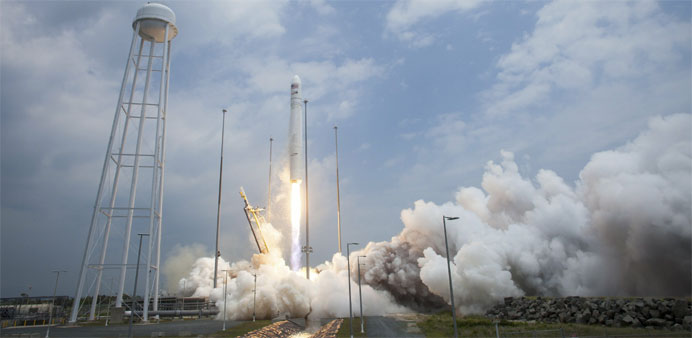AFP/Washington
Orbital Sciences Corporation's unmanned cargo ship arrived Wednesday at the International Space Station carrying a load of food and equipment for the six-man crew at the research outpost.
The vessel called Cygnus was grabbed by the space station's robotic arm at 6:36 am (1036 GMT) and completed the berthing procedure that attached the spaceship to the ISS at 1253 GMT, NASA said.
"Cygnus is now hard-mated to the International Space Station's Harmony module," where it will stay for the next four weeks, a commentator said on NASA's live broadcast of the event.
The spacecraft, which is shaped like a giant beer keg, launched from Wallops Island, Virginia on Sunday atop an Antares rocket.
Astronauts are scheduled to open the hatch on Thursday, but they may do so as early as Wednesday if the work of bolting the cargo ship to the orbiting lab goes faster than planned.
The spacecraft is packed with 3,653 pounds (1,657 kilograms) of gear for the space station. Much of the load is prepackaged food for the crew, but the cargo also contains Earth-imaging satellites, experiments for growing arugula in space and a pump for the Japanese module to replace one that failed.
The mission, known as Orb-2, is the second of eight that Orbital has contracted with NASA, and is the third journey by a Cygnus to the International Space Station after a successful demonstration trip last year.
Orbital Sciences and SpaceX are the two private US companies that have won major contracts with NASA for multiple missions to carry supplies to the International Space Station.
Orbital's deal is worth $1.9 billion and SpaceX's contract is for $1.6 billion.
Orbital's cargo ships burn up on re-entry into Earth's atmosphere, unlike SpaceX's Dragon spacecraft, which makes an intact splash landing in the ocean.
Astronauts will fill the Cygnus with trash and it will be robotically unbolted from the space station on August 15 and "released for a destructive re-entry in Earth's atmosphere," NASA said.
NASA relies on private companies for cargo missions since the US space agency lost its capacity to reach the ISS after the 30-year space shuttle program ended in 2011.
SpaceX and Orbital now make regular resupply journeys with their unmanned cargo ships. Europe and Russia also have their own spaceships that can tote equipment and provisions to the research outpost.
In order for astronauts to get there, nations must buy seats aboard Russia's Soyuz spacecraft, at a cost of $70.7 million each. The spaceship carries three people at a time.
Several American companies are competing to be the first to complete a crew vehicle that will restore US access to the station in the next few years.

